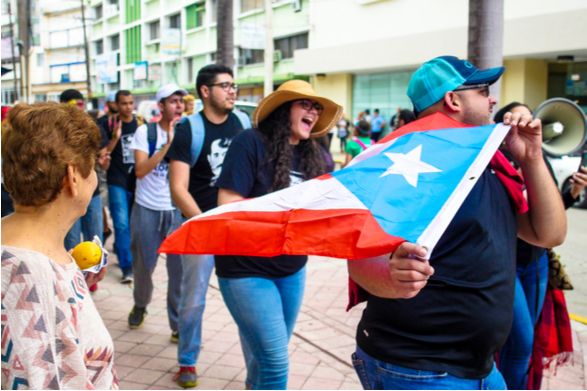The popular suspicion, or at least the very popular hope, among Puerto Rican activists is that Wanda Vázquez will quit rather than becoming the island’s governor Friday — not least because local women’s rights activists hate the idea.
The biggest problem for Vázquez is her ties to Gov. Ricardo “Ricky” Rosselló, who stepped down last week after the revelation of 900 pages of offensive messages. Not only is she a member of his New Progressive Party, Rosselló gave Vázquez her current position as justice secretary.
She also faces allegations that she refused to investigate corruption charges against members of her own party, choosing rather to cover up for Rosselló and his clique. Puerto Rico’s Office of Government Ethics said it is probing her for possible ethical violations, and she has already faced criminal charges over ethics concerns, though a judge deemed the evidence insufficient.
For a woman who could be the island’s second-ever female governor, however, Vázquez also faces fierce opposition from women’s rights activists. What gives?
Before she was secretary of justice, Vázquez spent seven years as the director of Puerto Rico’s women’s affairs office, which promotes gender equality and works to prevent domestic violence, discrimination against women and sexual assault, among other priorities.
The women activists, however, see her tenure in that role and her subsequent career as emblematic of the island’s corrupt and indifferent political class, which is why the prospect of Vázquez in the governor’s fortress repels them.
The latest political crisis has had a particular poignancy for women. The chats between Rosselló and members of his cabinet included sexist comments and the denigration of female politicians. And the island has also seen a disturbing recent uptick in violence against women, especially since Hurricane Maria struck. The Rosselló government’s response has been lacking, Puerto Rican feminists say.
But the complaints of Puerto Rican women are not your regular old identity politics. Puerto Ricans are fed up with widespread corruption and dysfunction, which touches women’s lives as much as it does men’s.
Many Puerto Ricans think their leaders have spent their time in office advancing their own interests instead of serving citizens. The government has thus failed to perform its most basic functions: enforcing justice and keeping its citizens, including women, safe from violent crime.
Puerto Ricans are now holding Vázquez responsible for these derelictions of duty.
Among those who gathered outside the Department of Justice building Monday to demand Vázquez’s resignation — the numbers were smaller than last week’s uprising — were a cluster of women who called themselves Mujeres en Resistencia, or “Women in Resistance.” The women sat side by side, holding hands, their mouths shut by duct tape. Others banged pots and pans, played music and waved flags.
These women remember Vázquez’s failures and missteps, not least how she skipped out three years before the end of her 10-year term so she could assume an even more powerful role at Rosselló’s Department of Justice, a post equivalent to that of state attorney general.
During Vázquez’s tenure at Justice, violent crime against women rose. In 2018, 51 women were murdered in Puerto Rico. According to the Women’s Affairs Office, 23 of those women were killed by their partners. That’s an increase from 2017, when 33 women were murdered, with 11 of these stemming from domestic violence issues, PBS reported. Yet police reports indicate that roughly half of those murders have been investigated fully, much less prosecuted.
In both of these previous political posts, Vázquez “has not been able to meet our needs, she didn’t do good,” says Sylvia Calzada, one of two older ladies I talked to at Monday’s #WandaRenuncia protests. “She betrayed the women’s movement, she never did enough, only helping corruption.”
Vázquez’s record indicates “she doesn’t care about women or people or justice,” says Mariliana Martinez, a 22-year-old teacher. “It’s not OK to be a person like that and not care and still have so much power.”
“She’s an unconditional — she will always vote for the party,” adds Mariana Nogales, a lawyer who focuses on free speech and First Amendment cases. Vázquez “has no independence,” and so she’s “been on women’s blacklist for a long time.”
Indeed, well before the recent wave of protests, women’s rights advocates have been leading demonstrations against the Rosselló government. In November 2018, the Colectiva Feminista en Construcción, a grassroots feminist group, organized a “sleepover” in front of La Fortaleza, the governor’s mansion in Old San Juan, to shed light on women’s issues and to demand a state of emergency declaration over gender violence. And so, feminist groups began to put together a “very organized” grassroots effort to put pressure on Vázquez and other members of government, Nogales tells me.
Eventually, someone is going to have to take charge of the island. Whoever that is, he or she is bound to be politically weak and fearful of popular wrath. And perhaps that would be a good thing for a political class long accustomed to its corrupt privileges.


